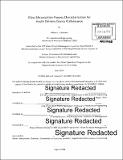Glass siliconization process characterization for insulin delivery device performance
Author(s)
Schacherl, Jeffrey D
DownloadFull printable version (21.50Mb)
Other Contributors
Leaders for Global Operations Program.
Advisor
Thomas Roemer and Jung-Hoon Chun.
Terms of use
Metadata
Show full item recordAbstract
Baked-in siliconization of glass cylinders, primary insulin containers, is a manufacturing process that is critical to the performance of drug delivery devices. Delivery devices are evolving and placing additional burden on production processes. Variability in siliconization and baking processes affects the resulting friction characteristics that are related to device performance criteria such as injection time and velocity, which are critical to the patient experience. The principal objective is to better characterize the performance of siliconized and baked glass, enabling improvement of device injection performance. A controlled study was conducted in order to strip away extraneous variables and enhance experimental control. State-of-the-art nanoscale measurement techniques and tribological (friction) equipment were employed to test the physical characteristics of silicone-coated glass. Data collected was statistically analyzed to determine relative significance of primary factors as well as variable interactions, with respect to friction of the rubber versus coated glass system. Lack of silicone or "dry spots" were found to be a key concern for siliconized glass. Siliconization amount was empirically modeled and found to have an exponential relationship with the coefficient of friction. High velocities exacerbated issues arising from lack of silicone. Based on the test results, a clearer definition of proper baked-in glass siliconization has emerged. Recommendations included minimum siliconization amount and an awareness of significant variable effects and interactions on system friction. Groundwork has been laid for further work including process optimization in the pursuit of improving insulin delivery device injection performance. The opinions expressed herein are solely those of the author and do not necessarily reflect those of Sanofi.
Description
Thesis: M.B.A., Massachusetts Institute of Technology, Sloan School of Management, 2016. In conjunction with the Leaders for Global Operations Program at MIT. Thesis: S.M. in Engineering Systems, Massachusetts Institute of Technology, Department of Mechanical Engineering, 2016. In conjunction with the Leaders for Global Operations Program at MIT. Cataloged from PDF version of thesis. Includes bibliographical references (pages 84-86).
Date issued
2016Department
Leaders for Global Operations Program at MIT; Massachusetts Institute of Technology. Department of Mechanical Engineering; Sloan School of ManagementPublisher
Massachusetts Institute of Technology
Keywords
Sloan School of Management., Mechanical Engineering., Leaders for Global Operations Program.